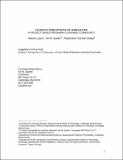| dc.contributor.author | Bras, Rafael L. | en_US |
| dc.contributor.author | Epstein, Ari W. | en_US |
| dc.contributor.author | Hodges, Kip Vernon | en_US |
| dc.contributor.author | Lipson, Alberta | en_US |
| dc.date.accessioned | 2009-10-19T13:29:43Z | |
| dc.date.available | 2009-10-19T13:29:43Z | |
| dc.date.issued | 2007-05 | en_US |
| dc.identifier.issn | 1059-0145 | en_US |
| dc.identifier.issn | 1573-1839 | en_US |
| dc.identifier.uri | http://hdl.handle.net/1721.1/49458 | |
| dc.description.abstract | We present a descriptive case study of Terrascope, an innovative, year-long, project-based learning community at MIT. Each year, Terrascope students study a particular environmental or Earth-system problem from a multidisciplinary perspective. Terrascope includes both academic and non-academic components; this paper focuses on the academic components. The objectives of the academic subjects, and of the program as a whole, involve helping students develop their team-building, communication, problem-solving, and self-regulatory learning skills. This study focuses on cohorts of students from the first and second years of the program (2002–2003 and 2003–2004); it is based on end-of-semester surveys and focus groups, and on additional focus groups conducted when these students were upperclassmen. Students felt Terrascope helped them make significant improvements in their ability to work in teams and to take on complex, multidisciplinary problems. They felt that the program’s two-semester structure gave them an opportunity to develop and nurture these skills, and that the program prepared them well for their later work at MIT. They also felt that being engaged, as freshmen, in a distinct learning community, significantly eased their transition into MIT. We describe lessons learned in the development of Terrascope and offer suggestions for other institutions planning to develop similar programs. | en_US |
| dc.language.iso | en_US | en_US |
| dc.publisher | Springer Netherlands | en_US |
| dc.relation.isversionof | http://dx.doi.org/10.1007/s10956-007-9046-6 | en_US |
| dc.rights | Article is made available in accordance with the publisher's policy and may be subject to US copyright law. Please refer to the publisher's site for terms of use. | en_US |
| dc.source | Ari W. Epstein | en_US |
| dc.subject | self-directed learning | en_US |
| dc.subject | environmental education | en_US |
| dc.subject | freshman | en_US |
| dc.subject | teamwork | en_US |
| dc.subject | interdisciplinary learning | en_US |
| dc.subject | project-based learning | en_US |
| dc.subject | experiential learning | en_US |
| dc.subject | assessment | en_US |
| dc.title | Students’ Perceptions of Terrascope, A Project-Based Freshman Learning Community | en_US |
| dc.type | Article | en_US |
| dc.identifier.citation | Lipson, Alberta, Ari Epstein, Rafael Bras, and Kip Hodges. 2007. Students’ Perceptions of Terrascope, A Project-Based Freshman Learning Community. Journal of Science Education and Technology 16, no. 4: 349-364. doi:10.1007/s10956-007-9046-6. | en_US |
| dc.contributor.department | Massachusetts Institute of Technology. Department of Civil and Environmental Engineering | en_US |
| dc.contributor.department | Massachusetts Institute of Technology. Department of Earth, Atmospheric, and Planetary Sciences | en_US |
| dc.contributor.department | Massachusetts Institute of Technology. Teaching and Learning Laboratory | en_US |
| dc.contributor.department | Massachusetts Institute of Technology. Office of Experiential Learning | en_US |
| dc.contributor.approver | Epstein, Ari W. | en_US |
| dc.contributor.mitauthor | Lipson, Alberta | en_US |
| dc.contributor.mitauthor | Hodges, Kip Vernon | en_US |
| dc.contributor.mitauthor | Bras, Rafael L. | en_US |
| dc.contributor.mitauthor | Epstein, Ari W. | en_US |
| dc.relation.journal | Journal of Science Education and Technology | en_US |
| dc.eprint.version | Author's final manuscript | |
| dc.type.uri | http://purl.org/eprint/type/SubmittedJournalArticle | en_US |
| eprint.status | http://purl.org/eprint/status/PeerReviewed | en_US |
| dspace.orderedauthors | Lipson, Alberta; Epstein, Ari W.; Bras, Rafael; Hodges, Kip | en |
| dc.identifier.orcid | https://orcid.org/0000-0003-3843-0391 | |
| dc.identifier.orcid | https://orcid.org/0000-0003-0208-1935 | |
| mit.license | PUBLISHER_POLICY | en_US |
| mit.metadata.status | Complete | |
